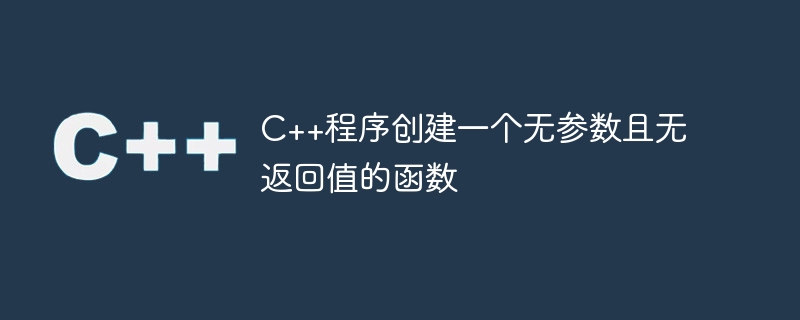

In programming languages, functions are used to modularize code. In many applications, we create submodules to make our code easy to write, easy to debug, and optimize by repeatedly rejecting unnecessary code. To implement these functions, functions appear on the screen. In many cases, functions accept parameters and return something. Sometimes it may not accept any parameters but return something. There are also special cases where functions neither accept any parameters nor return anything. In this tutorial, we will introduce such a function in C without parameters and return value.
To define a function without parameters and return type, the return type must be void, the parameter list can be empty, or we can write void there. The syntax is as follows.
void function_name ( ) {
// function body
}
void function_name ( void ) {
// function body
}
In a scenario like this, where we just print something, or perform any operation like display, or perform some tasks inside the function, this situation is suitable for this type of function. Let's look at an example of this and see the implementation in C. In our first example, we will print a fixed 10-row star pyramid.
#include <iostream>
#include <sstream>
using namespace std;
void pyramid( ) {
for( int i = 1; i <= 10; i++ ) {
for( int j = 1; j <= 10 - i; j++ ) {
cout << " ";
}
for( int j = 1; j <= i; j++ ) {
cout << "* ";
}
cout << endl;
}
}
int main()
{
pyramid();
}
*
* *
* * *
* * * *
* * * * *
* * * * * *
* * * * * * *
* * * * * * * *
* * * * * * * * *
* * * * * * * * * *
The program prints only 10 sizes of pyramids. Since the size is fixed, it takes no arguments, and since it prints the asterisk directly, nothing is returned. Let's look at another example like Star Pyramid, which takes input from the user, but we also don't pass any parameters and the function doesn't return anything.
#include <iostream>
#include <sstream>
using namespace std;
void pyramid( void ) {
int n;
cout << "Enter line numbers: ";
cin >> n;
for( int i = 1; i <= n; i++ ) {
for( int j = 1; j <= n - i; j++ ) {
cout << " ";
}
for( int j = 1; j <= i; j++ ) {
cout << "* ";
}
cout << endl;
}
}
int main()
{
pyramid();
}
Enter line numbers: 18
*
* *
* * *
* * * *
* * * * *
* * * * * *
* * * * * * *
* * * * * * * *
* * * * * * * * *
* * * * * * * * * *
* * * * * * * * * * *
* * * * * * * * * * * *
* * * * * * * * * * * * *
* * * * * * * * * * * * * *
* * * * * * * * * * * * * * *
* * * * * * * * * * * * * * * *
* * * * * * * * * * * * * * * * *
* * * * * * * * * * * * * * * * * *
Here we use the cin method to obtain user input. This solution requires no additional parameter passing.
Functions are used to make the code modular and easy to handle. In most cases, we use functions that accept parameters and return some value after some calculations. But this is not a mandatory process. In this article, we discussed how to write a function in C that takes no parameters and returns nothing. We can use this type of function when a certain task is predefined. Like in our first example, the star pyramid only has 10 rows, so no additional input is required. In the second example, we take the line number as input, but not as an input parameter. We get the input directly from the user and store it in a local variable inside this function and then use it in the loop.
The above is the detailed content of C++ program creates a function with no parameters and no return value. For more information, please follow other related articles on the PHP Chinese website!
 How to start mysql service
How to start mysql service
 How to skip network connection during win11 installation
How to skip network connection during win11 installation
 How to solve the problem that the phpstudy port is occupied
How to solve the problem that the phpstudy port is occupied
 How to repair win7 system if it is damaged and cannot be booted
How to repair win7 system if it is damaged and cannot be booted
 xenserver
xenserver
 Is Code Red a computer virus?
Is Code Red a computer virus?
 stackoverflowatline1
stackoverflowatline1
 How to cancel Douyin account on Douyin
How to cancel Douyin account on Douyin
 What are the differences between Eclipse version numbers?
What are the differences between Eclipse version numbers?




